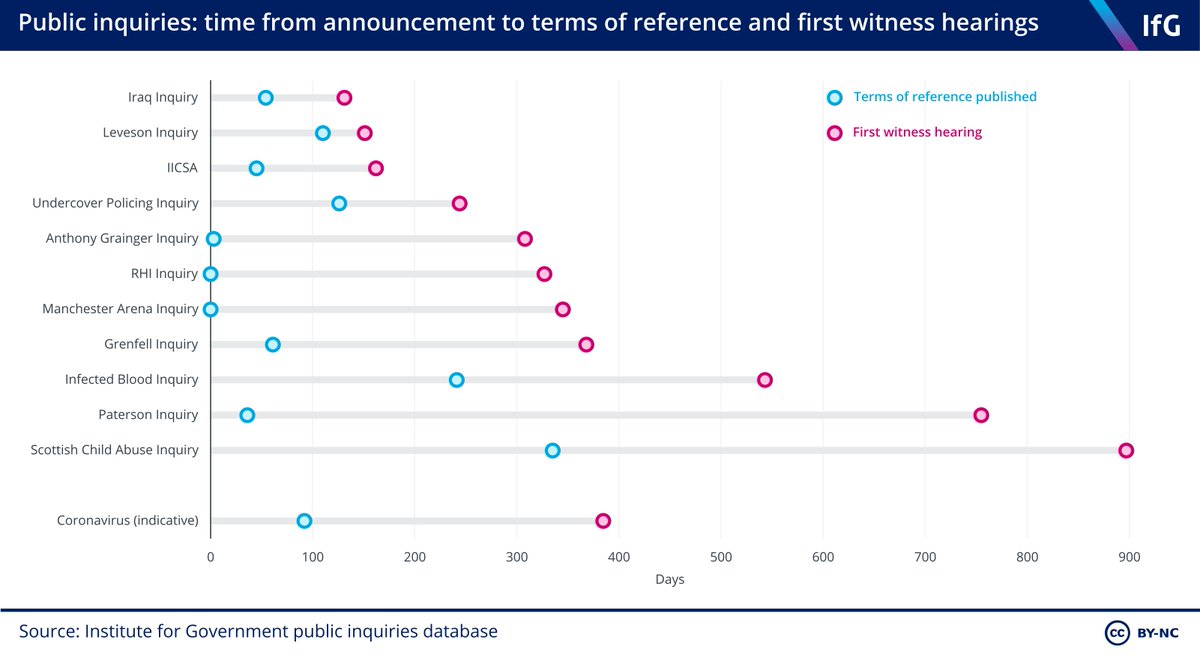There& #39;s a link between the rising acrimony in Whitehall and the lack of a public inquiry.
The government has once again pushed off calls for a formal investigation of what happened during the crisis.
This is wrong, and makes accountability harder, feeding the cycle of blame.
The government has once again pushed off calls for a formal investigation of what happened during the crisis.
This is wrong, and makes accountability harder, feeding the cycle of blame.
Yesterday the got responded to the letter from @CovidJusticeUK calling for a public inquiry.
The request is a good one, and @instituteforgov will be publishing our own case for an inquiry this week.
This is about learning lessons, not placing blame https://www.theguardian.com/world/2021/apr/25/uk-governments-claim-it-is-too-busy-for-covid-inquiry-prompts-anger">https://www.theguardian.com/world/202...
The request is a good one, and @instituteforgov will be publishing our own case for an inquiry this week.
This is about learning lessons, not placing blame https://www.theguardian.com/world/2021/apr/25/uk-governments-claim-it-is-too-busy-for-covid-inquiry-prompts-anger">https://www.theguardian.com/world/202...
The govt makes three arguments against an inquiry:
1) It would be a distraction for decision makers
2) It would use up important resources
3) Other bodies (e.g. NAO) are providing answers
1) It would be a distraction for decision makers
2) It would use up important resources
3) Other bodies (e.g. NAO) are providing answers
Re: distraction
The reason to establish an inquiry now is because they take time to get going. The PM and others won& #39;t getting subpoenaed anytime soon (which might interfere with the ongoing management of the crisis). Inquiries work quietly, in the background.
The reason to establish an inquiry now is because they take time to get going. The PM and others won& #39;t getting subpoenaed anytime soon (which might interfere with the ongoing management of the crisis). Inquiries work quietly, in the background.
Leveson was one of the quickest inquiries to hearings in recent history, and that still took nearly 4.5 months.
An indicative timeline for a COVID inquiry established today (based on average of previous inquiries) would see ToR on 25 June 2021 and first hearings on 15 May 2022
An indicative timeline for a COVID inquiry established today (based on average of previous inquiries) would see ToR on 25 June 2021 and first hearings on 15 May 2022
And god forbid the crisis is still raging in May next year, it& #39;s not like an inquiry would purposefully interfere with the work of govt.
They have traditionally been very deferential to external priorities - this is one of the reasons they often get delayed/prolonged
They have traditionally been very deferential to external priorities - this is one of the reasons they often get delayed/prolonged
Re: resources
This will be a big and complex inquiry; potentially the biggest ever. But even a big inquiry is unlikely to have a staff of more than 20-40 people, which is miniscule in government terms. If the govt can& #39;t support this then it REALLY has bigger issues
This will be a big and complex inquiry; potentially the biggest ever. But even a big inquiry is unlikely to have a staff of more than 20-40 people, which is miniscule in government terms. If the govt can& #39;t support this then it REALLY has bigger issues
Re: other people doing this work
The NAO (as ever) has done amazing work looking at the govt& #39;s response to COVID. But its remit is clear and limited. It can look at how money flowed and the outcomes, but it can& #39;t get deep into how decisions were made. https://www.nao.org.uk/covid-19/ ">https://www.nao.org.uk/covid-19/...
The NAO (as ever) has done amazing work looking at the govt& #39;s response to COVID. But its remit is clear and limited. It can look at how money flowed and the outcomes, but it can& #39;t get deep into how decisions were made. https://www.nao.org.uk/covid-19/ ">https://www.nao.org.uk/covid-19/...
Similarly select committees in parliament have been doing good work. But they have even fewer powers than the NAO, and have limited time and resources.
And internal reviews by govt departments (while an important way to learn lessons on the go) are not an independent account
And internal reviews by govt departments (while an important way to learn lessons on the go) are not an independent account
Put simply, a public inquiry is the only way to deliver real accountability.
This isn& #39;t about placing blame.
It& #39;s about having a truly independent process which can go further in its investigations than anyone else - to establish a truthful account of what happened.
This isn& #39;t about placing blame.
It& #39;s about having a truly independent process which can go further in its investigations than anyone else - to establish a truthful account of what happened.
The lack of a public inquiry creates a vaccum.
We are seeing an (increasingly vicious) briefing war involving current and former Whitehall insiders.
There is no way to get an authoritative, truthful account of what happened - rather we get a contradictory set of assertions.
We are seeing an (increasingly vicious) briefing war involving current and former Whitehall insiders.
There is no way to get an authoritative, truthful account of what happened - rather we get a contradictory set of assertions.
A public inquiry would create a proper forum to gather these accounts and discern the truth of them.
Its existence would offer the government a shield - the proper way for people to settle their accounts is there, not on the front pages of the newspapers
Its existence would offer the government a shield - the proper way for people to settle their accounts is there, not on the front pages of the newspapers
In short, the government should announce an inquiry now. This would create a space for a national discussion about what it should cover, what lessons need to be learned, the accounts that the public need and deserve to hear.
Better this than increasingly bitter gossip and leaks
Better this than increasingly bitter gossip and leaks
More research on this from myself, @Emma_Norris and @instituteforgov to follow soon

 Read on Twitter
Read on Twitter


